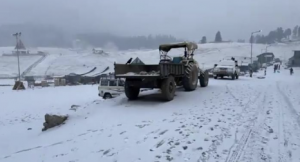SRINAGAR: On Saturday, the nighttime temperature in most of Jammu and Kashmir dropped but remained above average, with the exception of the twin cities of Srinagar and Jammu. The forecast called for isolated to scattered precipitation in the next 24 hours and fairly widespread moderate to light rain and snow in the next two days. According to a representative of the meteorological department, cloudy conditions with a chance of light snow are predicted for certain upper regions in the late hours of today. He stated that mainly cloudy conditions with widely distributed light to heavy rain and snow were anticipated for January 28 and 29. He stated that there is a chance of mild to moderate rain or snow in several locations from January 30-31. The weatherman has also issued an advice, stating that the current system may result in the temporary closure of significant passes and higher-elevation highways, such as the Mughal Road, Sinthan Pass, Razdan Pass, Zojila, etc., especially from January 28 to January 31.“Travellers are advised to Plan accordingly,” he stated. With the exception of the twin capitals, nighttime temperatures hovered above average throughout. Srinagar had a low of 2.3°C, down from 0.5°C the night before, and it was 1.3°C below average for this time of year for the summer capital of J&K. According to Qazigund, the minimum temperature was 2.2°C, as opposed to negative 0.2°C the night before.According to the MeT official, the minimum temperature was 0.4°C higher than usual for Kashmir’s gateway town. In contrast to the previous night’s low of minus 0.4°C, Pahalgam recorded a low of minus 5.1°C, which was 1.0°C above average for the well-known south Kashmir resort. According to the official, Kokernag, located in south Kashmir, saw a minimum temperature of minus 0.8°C, down from minus 0.1°C the night before. The temperature was also 1.8°C higher than usual for the area. According to the official, Kupwara town in north Kashmir saw a low of – 2.4°C, down from 2.5°C the night before, and was 0.1°C above average. According to the official, Gulmarg saw a low of minus 6.4°C, down from minus 3.7°C the night before. The temperature was also 1.1°C higher than usual for the well-known north Kashmiri skiing resort. He claimed that Jammu recorded a minimum temperature of 7.0°C, which was 1.7°C below average for J&K’s winter capital. He said that the lows in Banihal (0.4°C), Batote (3.1°C), and Bhaderwah (minus 0.2°C) were recorded. The Kashmir valley is experiencing “Chillai-Kalan,” a severe 40-day winter season that ends on January 29. It does not, however, signal the end of winter. The next two periods are called “Chillai-Khurd,” which lasts for 20 days from January 30 to February 19, and “Chillai-Bachha,” or “baby cold,” which lasts for 10 days from February 20 toMarch 1.

